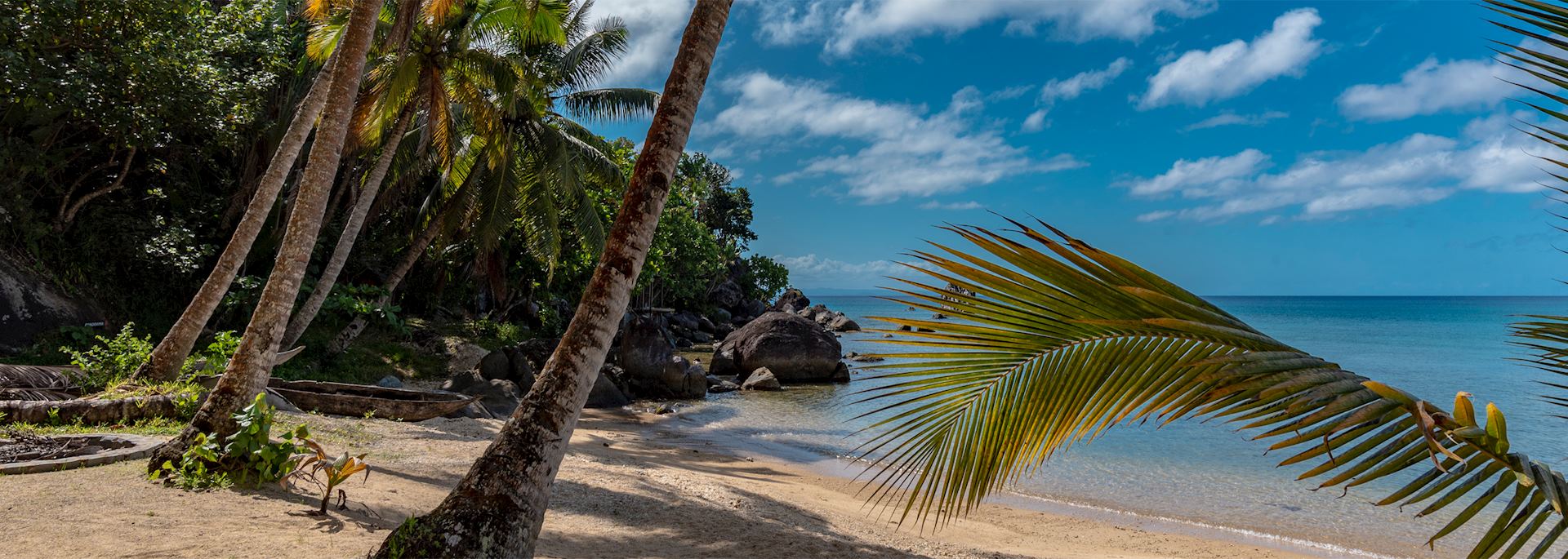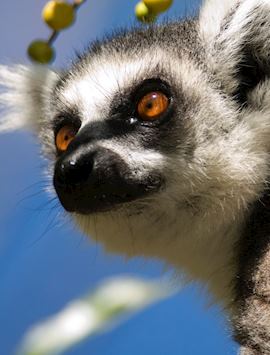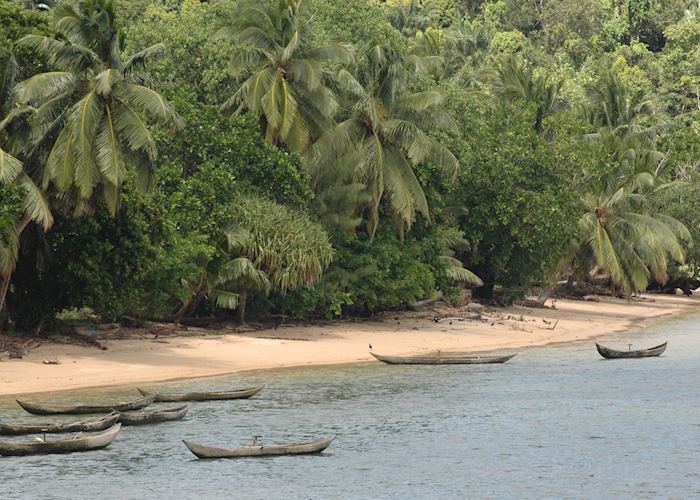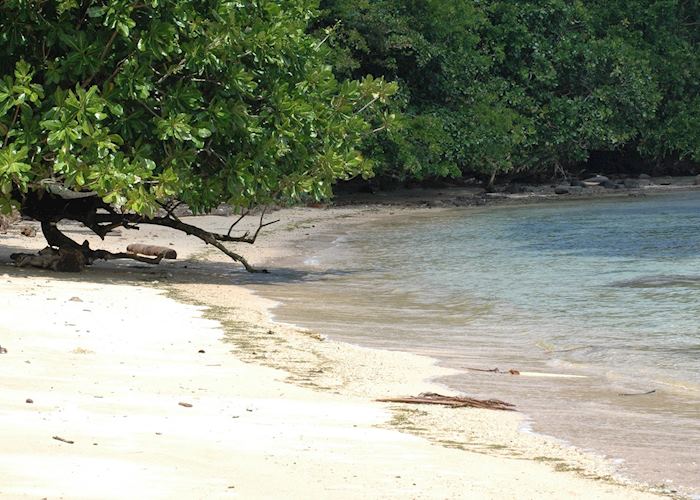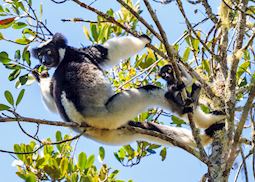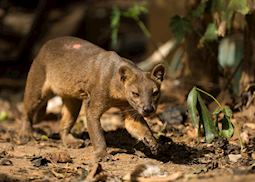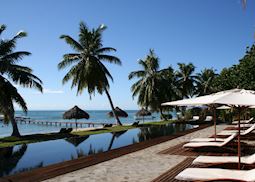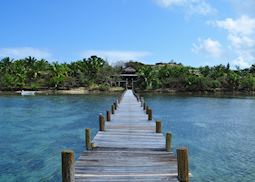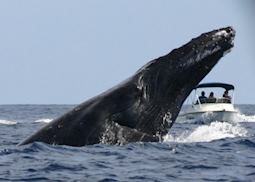Jump to:
A thin strip of land off Madagascar’s northeast coast, sleepy Île Sainte-Marie (also known as Nosy Boraha) is a place of soft-sand beaches backed by palms and fishing villages where old traditions are still alive and well. You can spend the last few days of your Madagascar trip relaxing on the shores, diving in reefs clouded with kaleidoscopic fish and, between June and September, looking for migratory humpback whales offshore.
The island was a popular base for pirates who plundered the Indian Ocean in the 17th and 18th centuries. Today, though, the one and only town, Ambodifotatra, is an undisturbed haven with a handful of cafés, a Catholic church and a popular market.
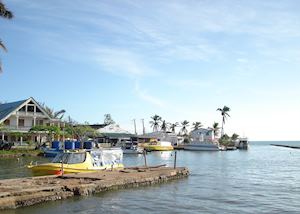 After a busy trip taking in Madagascar’s highlights and hiking through forest in search of the country’s unique collection of wildlife, a few days of island relaxation calls. You don’t have to go far, with Île Sainte-Marie easily accessed via a short light aircraft from Antananarivo.
After a busy trip taking in Madagascar’s highlights and hiking through forest in search of the country’s unique collection of wildlife, a few days of island relaxation calls. You don’t have to go far, with Île Sainte-Marie easily accessed via a short light aircraft from Antananarivo.
Here, you can take a more relaxed pace. Staying in a small beachside lodge, you can fill your days with as much activity as you like. Near-deserted beaches of creamy sand are lapped by clear water warmed by the sun, where you can spend entire days unwinding with a book.
Your lodge can usually provide you with snorkelling equipment so you can observe life beneath the waves. If you’re an experienced diver, head out on a diving session to the coral reefs, while beginners can opt to take a diving course to obtain an international PADI certificate.
If you’re visiting between June and September, you can take a boat trip in search of humpback whales, which migrate from Antarctica to Madagascar’s warm waters to breed and calve. Guides, who are often marine researchers, can help locate the whales and tell you more about them as you watch them spout water and flip their flukes above the waves.
Back on dry land, most lodges have bicycles for hire. You could spend a morning or afternoon pedalling along (poorly maintained) roads lined with mango, clove, cinnamon and breadfruit trees, pausing at fishing villages dotted with bamboo houses. As you pass beaches, you’ll notice traditional wooden pirogue boats moored in the shallows.
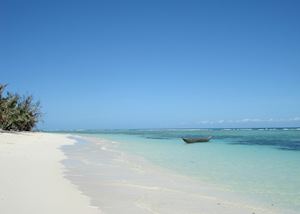 You can take a guided trip to the island’s only town, Ambodifotatra, to find out more about its past role in 17th- and 18th-century piracy. Its strategic position close to the maritime routes linking ships to the East Indies, along with the island’s abundance of sheltered bays and inlets, made it a base for infamous pirates such as Olivier Levasseur, who was known as La Buse (The Buzzard) for the speed and ruthlessness of his attacks, and Henry Every, dubbed ‘The King of Pirates’ after being one of few pirate captains to have escaped with his bounty without being arrested.
You can take a guided trip to the island’s only town, Ambodifotatra, to find out more about its past role in 17th- and 18th-century piracy. Its strategic position close to the maritime routes linking ships to the East Indies, along with the island’s abundance of sheltered bays and inlets, made it a base for infamous pirates such as Olivier Levasseur, who was known as La Buse (The Buzzard) for the speed and ruthlessness of his attacks, and Henry Every, dubbed ‘The King of Pirates’ after being one of few pirate captains to have escaped with his bounty without being arrested.
It’s also worth taking time to explore the town’s market, enjoy a cold drink in one of its pavement cafés and see Madagascar’s oldest church, the red-roofed Notre Dame de l’Assomption, built by French Catholics in 1857 (unfortunately it’s closed to visitors).
At the end of each day, you can dine on fresh seafood (the island’s particularly known for its crab) washed down with Île Sainte-Marie’s signature drink — coconut milk enlivened by a large measure of pastis.
Best time to visit Île Sainte-Marie
You can visit Île Sainte-Marie from April to December, with only the cyclone-prone months of January to March worth avoiding. To time with whale watching season, visit between June and September.
who's been there

Start planning your tailor-made trip to Île Sainte-Marie by contacting one of our Madagascar specialists
-
01993 838 92501993 838 585
- Make an enquiry
Suggested itineraries featuring Île Sainte-Marie
Our itineraries will give you suggestions for what is possible when you travel in Île Sainte-Marie, and they showcase routes we know work particularly well. Treat them as inspiration, because your trip will be created uniquely by one of our specialists.
Places near Île Sainte-Marie
- Masoala National Park 92 miles away
- Nosy Mangabe 100 miles away
- Maroantsetra 105 miles away
- The Pangalanes Canal 124 miles away
- Mantadia National Park 170 miles away
- Andasibe National Park (Perinet) 171 miles away
- Antananarivo 209 miles away
- Anjajavy Private Nature Reserve 223 miles away
- The islands & beaches of Madagascar 252 miles away
- Ankify 255 miles away
- Baobab Beach 258 miles away
- Nosy Komba 261 miles away
- Nosy Be 272 miles away
- Antsirabe 278 miles away
- Ankarana Special Reserve 281 miles away
- Nosy Mitsio Archipelago 291 miles away
Photos of Île Sainte-Marie
Our expert guides to exploring Île Sainte-Marie
Written by our specialists from their own experiences of visiting Île Sainte-Marie, these guides will help you make the most of your time there. We share both our practical recommendations and the best ways to appreciate Île Sainte-Marie at its best.
-
Family holidays in Madagascar ![Indri, Andasibe]()
Family holidays in Madagascar
Family holidays in Madagascar
Thanks to a DreamWorks film of the same name, Madagascar proves a popular choice for many children. As the animals found here are no threat to humans, you and your family are safe to explore the endless parks on foot, in search of local wildlife.
Read this guide -
Madagascar’s wildlife: A quirk of evolution ![Fossa, Madagascar]()
Madagascar’s wildlife: A quirk of evolution
Madagascar’s wildlife: A quirk of evolution
Madagascar’s forests shelter so many endemic wildlife species that visiting is like arriving on another planet. Following your guide through the trees, Indris cry overhead while chameleons lie perfectly camouflaged in the undergrowth. Africa specialist Andrew shares his wildlife experiences.
Read this guide
Accommodation choices for Île Sainte-Marie
We've selected a range of accommodation options for when you visit Île Sainte-Marie. Our choices usually come recommended for their character, facilities and service or location. Our specialists always aim to suggest properties that match your preferences.
-
![Princess Bora, Ile Sainte Marie]()
Princesse Bora Lodge & Spa
Île Sainte-Marie -
![Boraha Village, Ile Sainte Marie]()
Boraha Village
Île Sainte-Marie
Ideas for experiencing Île Sainte-Marie
Our specialists seek out authentic ways to get to know the places that could feature in your trip. These activities reflect some of the experiences they've most enjoyed while visiting Île Sainte-Marie, and which use the best local guides.
-
Whale Watching ![Whale watching, Île Sainte-Marie, Madagascar]()
Whale Watching
Whale Watching
In June, humpback whales come from the waters of the South Pole to the Ste Marie Channel, not far off the coast. The channel is protected by the East coast of Madagascar and by Sainte-Marie, ideal for whales who come to breed and calve.
View details
